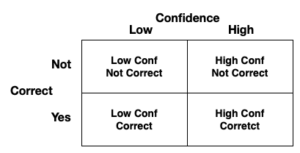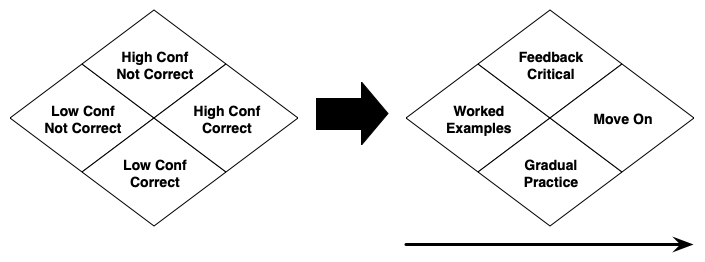Not surprisingly, I am prompted regularly to ponder new things. (Too often, in the wee hours of the morning…) In this case, I realize I haven’t given a lot of thought to the role of confidence (PDF). It’s a big thing in the system my co-author on an AI and ID paper, Markus Bernhardt, represents, so I realized it’s time to think about it some more. Here are some thoughts on confidence and correctness.
 The idea is that it matters whether you get it right, or not, and whether you’re confident, or not. That is, they interact (creating the familiar four quadrant model). You can be wrong and unconfident (lo/no), wrong and confident (hi/no), right and unconfident (lo/yay), and right and confident (hi/yay). Those are arguably importantly different. In particular for what they imply about what sort of intervention makes sense.
The idea is that it matters whether you get it right, or not, and whether you’re confident, or not. That is, they interact (creating the familiar four quadrant model). You can be wrong and unconfident (lo/no), wrong and confident (hi/no), right and unconfident (lo/yay), and right and confident (hi/yay). Those are arguably importantly different. In particular for what they imply about what sort of intervention makes sense.
I was pondering what this suggests for interventions. I turned it 90 degrees to the left, to put low/no to the left, or beginning spot, and hi/yay to the right, and the other two in-between. Simplified, my view is that if you’re wrong and not confident, you don’t know it. If you’re wrong and believe you know it, you’re at a potential teachable moment. When you’re right, but not confident, you’re ready for more practice. If you’re right and confident, it may be time to move on.
 Which suggests, looking back at my previous exploration of worked examples, that the very first thing to do is to provide worked examples if they’re new. At some point, you give them practice. If they get it right but aren’t confident, you give more practice at roughly the same level. If they’re wrong but confident, you give them feedback (and arguably ramp them backwards). Eventually they’re getting it right and confident, and at that point you move on (except for some spaced and varied reactivation).
Which suggests, looking back at my previous exploration of worked examples, that the very first thing to do is to provide worked examples if they’re new. At some point, you give them practice. If they get it right but aren’t confident, you give more practice at roughly the same level. If they’re wrong but confident, you give them feedback (and arguably ramp them backwards). Eventually they’re getting it right and confident, and at that point you move on (except for some spaced and varied reactivation).
Assessing confidence is an extra step, but there seems to be a valid reason to incorporate it in your learning design. The benefits of being able to more accurately target your interventions, at least in an adaptive system, suggest that the effort is worth it. That’s my initial thinking on confidence and correctness. What’s yours?
Leave a Reply